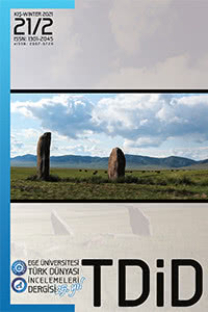Türk Kültüründe “Al” Renk
Eski inanç sistemlerini taşıma kapasiteleri, sembolik anlam taşıma güçleri ve hatırda kalıcı olmaları dolayısıyla renkler ve onların adı olan sözcükler bir toplum veya milletin kültürel miraslarını aktarmada önemli bir role sahiptir. Zaman içinde anlamlarında bazı değişmeler meydana gelse de, bir milletin yaşam tarzı ve inançlarıyla ilgili en eski evren ve dünyaya yönelik algıları renklerin adı olan kelimelerin kök anlamlarında taşıdıkları görülür. Farklı kültürlerde olduğu gibi, Türk kültüründe de renkler farklı anlamları taşıma yanında sembol olarak da kullanılmaktadır. Renkler başlangıçta bir inanç sisteminin temel unsurlarını yansıtan ritüellerde kullanılan semboller olarak kullanılırken, daha sonraları gerçek veya sembolik anlamlarıyla sözlü ve yazılı edebiyata taşınmış ve kullanılmaya başlanmıştır. Nerede kullanılırsa kullanılsınlar, renklerin bir toplumun erken dönem dünya algılarını kök anlamlarında her zaman korudukları görülür. Türk kültüründeki en eski renklerden biri “al” renktir. Al renk, Türklerin en eski inanç sistemlerinde ve törenlerinde kullanılmıştır. Bazen belli varlıkları olumlu olarak ifade eden, onları tanımlamada bir sıfat olarak kullanılırken, bazen de kötü varlıkların adı olarak kullanılmıştır. Her iki durumda da “al” renk Türklerin en eski dünya algılarını kök anlamında taşımaya devam etmiştir. Al renk her zaman “değişim ve dönüşüm” anlamına sahip olmuştur. Bu değişim ve dönüşüm anlamı yaratıcının vermiş olduğu veya yaratıcıdan gelen alan “ışık ve ısı”dan kaynaklanmaktadır. Bu ışık ve ısı güneşte, ateşte, altında ve diğer bazı varlıklarda görülebilir. Başka bir ifadeyle Tanrısal enerji de diyebileceğimiz bu ışık ve ısı her neye dokunursa, o varlık veya canlı “al” renge dönüşür, allaşır. Bu düşünceden hareketle “al” rengin ilk anlamını; “Tanrı tarafından verilen enerji ile değişen ve dönüşen nesne ve varlık” şeklinde açıklamak uygun olabilir. Bu makalede ilk olarak al rengin Türk düşüncesindeki temel anlamı açıklanacak, daha sonra bir sınıflama içinde bu rengin olumlu ve olumsuz anlamlarda kullanımı ve bunların nedenleri açıklanacak ve sonuç kısmında bu rengin her zaman koruduğu temel anlamın ne olduğu hakkındaki görüşlerimize yer verilecektir.
Anahtar Kelimeler:
Al, al renk, renkler, Türk kültürü
“Scarlet” The Color in Turkish Culture
Due to their capacity of carrying ancient beliefs, having symbolic meanings and being easy to keep in mind, colors and the words used as their names have important roles in transmitting the cultural heritage and the belief systems of a nation or a society. It should be pointed out that the colors related to ancient belief systems and lifestyle of a nation still carry on the deep rooted conceiving as a cultural heritage every time even though they might have some changes in meanings from time to time. As it is the case in many cultures, the colors carry different meanings and are used as symbols; it has been the same in Turkic culture as well. At first they bore the basic elements of the belief system, were used as the symbolic meanings in the beliefs, appeared in the rituals, and later they have also been transformed into the oral and written literary creations as well. Wherever they have been used and seen, their deeply rooted perception was always kept in. One of the most ancient colors in Turkic culture is “al (scarlet)”. It has been used as part of the ancient Turkic beliefs and rituals. Sometimes the color “al (scarlet)” has been used as a favorable adjective that described beings, sometimes used as an unfavorable name for creatures. In both cases, the color “al” carried the deeply rooted perception of the Turkic people. This color has always kept the meaning of “transformation and change”. This meaning must be related to light and heat of the creator. This light and heat may be observed in fire, in the sun, in gold or some other beings. Whatever this light and heat in other words the energy provided by God, touches that is transformed into “al (scarlet)”. As a result, the meaning of “al (scarlet)” might be explained “the thing or being is transformed and changed by the energy of Tengri”. In this article, I will initially try to explain the basic meanings of the color “al (scarlet)” in Turkic understanding. Secondly, I will classify and provide some examples about its favorable and unfavorable usages that will show how the meaning of the color “al (scarlet)” has been transformed. I will also discuss the reasons for those changes in the meaning of the color. In the conclusion part, I will try to explain deeply rooted and never changing meaning of this color.
Keywords:
Scarlet, scarlet color, colors, Turkish culture,
- ISSN: 1301-2045
- Başlangıç: 1996
- Yayıncı: Ege Üniversitesi Türk Dünyası Araştırmaları Enstitüsü
Sayıdaki Diğer Makaleler
Anadolu’daki Zühdî Halk Edebiyatının Ahmet Yesevî ile İlişkisi
Bağlama Edatlı Kuruluşların Başkurt Türkçesindeki Kullanımı Üzerine Bir Değerlendirme
Kula Evleri, Kapı Tokmakları ve Halkaları
Yrd. Doç. Dr. Serap Erçin KOÇER
Millî Bir Veli Yaratmak: Türk Edebiyatında İlk Mutasavvıflar Üzerinde Farklı Bir Okuma Denemesi
Asya Hunlarının Kurultay Yerleri Hakkında
Ahmed Yesevî'nin Mirâç-nâme'si ve Etkileri Üzerine Bir İnceleme
Salahaddin-i Uşşaki'nin Muamma Şerhlerine Dair
Salâhaddîn-i Uşşâkî’nin Muamma Şerhlerine Dair
“Yeni Hayat”tan “Milli Hayat”a, İntihardan Terkîbe Ziya Gökalp
